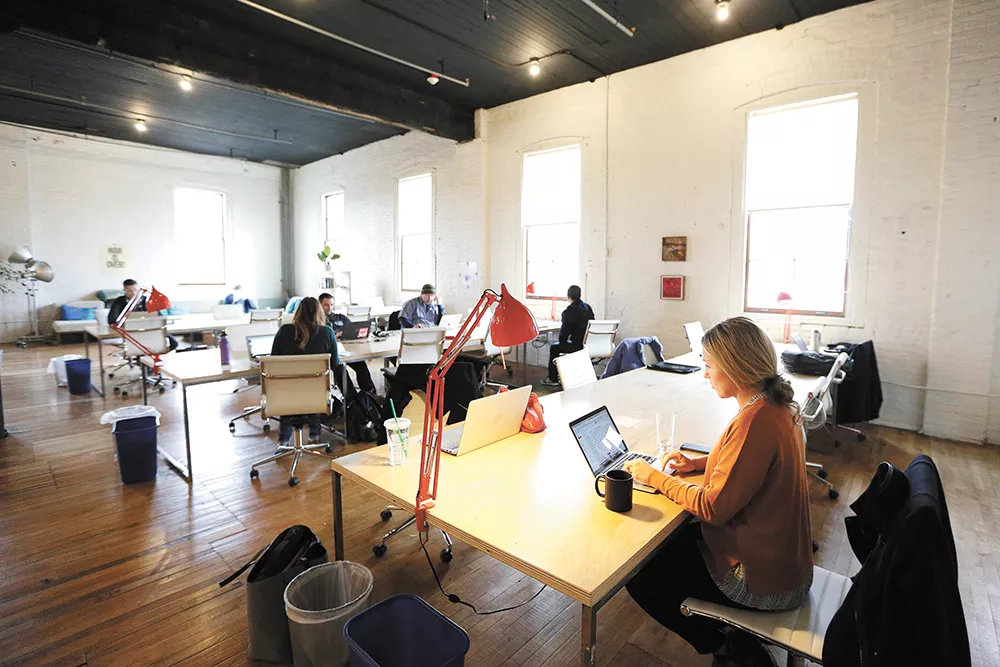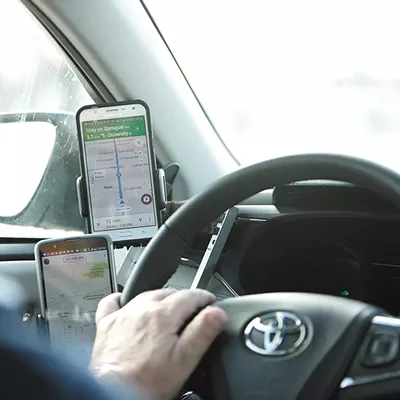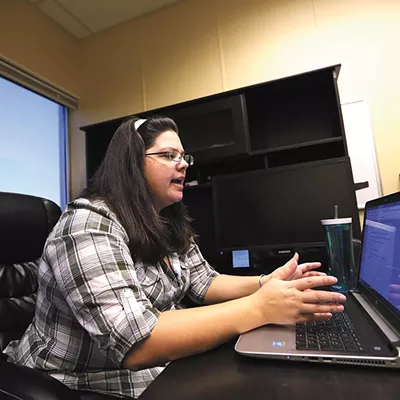
Dan Siddoway turns everywhere he goes into his own office. Laptop in tow, you can often find him typing web code in a booth at Thomas Hammer Coffee or designing a website at an Iron Goat Brewery table. Anywhere that has electrical outlets and a decent internet connection can temporarily transform into a corner cubicle. And if the weather's nice enough and his computer is charged, Siddoway says he'll even work in a secluded area of Manito Park.
It's the sort of solitude Thoreau could never have dreamed of.
"I always bring my computer to the bar now. It's kind of ridiculous," Siddoway says. People who've had a few too many drinks sometimes disruptively inquire about his work, ignoring the noise-canceling headphones.
"But they're starting to get used to it," he says. "I'm not the only one with my computer out anymore."
This has been the typical work schedule for the 32-year-old Spokane coder and web developer, who abandoned a full-time office job at Rainmaker Creative and now relies on one-off gigs and freelance projects.
It might sound like something of a nomadic existence, hunkering down in whatever location is most convenient at any given moment. But a lot of freelancers are starting to rely on coworking spaces, a more reliable and comfortable environment than your average Starbucks.
Siddoway frequents Level Up, the downtown public library's free coworking space. He's also paid for a membership at Fellow Coworking, located on the second floor of the Washington Cracker Co. Building. Spaces like Fellow allow those who rely on the gig economy to experience the advantages of a bustling office environment while still benefiting from the freedom of freelancing.
Started in 2013 by Luke Baumgarten, a co-founder of the arts group Terrain, Fellow currently hosts around 70 regular members, boasting talents ranging from mechanical engineering to IT security, fiction writing to ecotourism.
Baumgarten (a former Inlander staffer) and his Fellow partner Benji Wade, a web developer and former producer at North by Northwest Productions, recently started a small creative firm called Treatment. It's located in a small office at the back of Fellow, and its staff includes folks who still work as part-time freelancers.
"Treatment was born in Fellow and couldn't exist, for a lot of reasons, without it," Baumgarten says. "The gig economy is fueling Treatment because of these super-creative dudes who are choosing to spend a sizable amount of time following their passion."
Both Baumgarten and Wade say that they've seen a noticeable uptick in coders, web designers and other online creatives leaving secure jobs at large agencies to subsist solely on freelance gigs. Wade and two of his Treatment coworkers, game designer Nick Barr and photographer and videographer Tobias Hendrickson, previously worked at North by Northwest together and say they now have more time to focus on passion projects alongside their for-hire gigs.
They've also observed that the coworking environment actually encourages impromptu collaboration. Wade points to a recent video project he was working on that was presenting obstacles. He was able to outsource color-correction duties to a videographer who was a regular at Fellow, and they've since worked together on several other projects.
"That whole gig-economy thing happens a lot here," Wade says. "There are a lot of things at Treatment that aren't within the interests we have, so we'll refer it out to somebody else."
Siddoway says his own well-being has improved since he's started creating his own work schedule.
He works for a few hours in the morning — he's currently designing a website for a Danish beer company and developing software for a startup — and takes a break in the afternoon to either work out at the YMCA or chip away at some online courses he's enrolled in. He'll pick up work again in the late afternoon or early evening, sometimes over dinner or a beer.
This is still, he admits, an unorthodox way of making a living, especially in a country that still clings to the concept of a 40-hour workweek.
"But I think there are real benefits to this kind of freedom," he says. "I think people are starting to value the flexibility of it." ♦






















